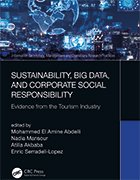Data drives corporate social responsibility in tourism
Digital transformation has implications for sustainability and corporate social responsibility — particularly in the tourism industry.
On the one hand, implementing new technology can be potentially costly, risky and environmentally taxing. On the other, upgrading existing systems offers new data and insights into a business’s sustainability effects. The tradeoff is complex and, in many industries, increasingly more difficult to quantify as transformations advance.
Tourism is one of the world’s largest and fastest-growing industries. To keep up with the ever-changing needs of tourists, businesses in the tourism industry are embracing digital transformation. Companies are adapting new-generation technology to all facets of travel organizing. Some examples include contactless check-in, keyless room access and virtual tours, which let potential travelers scope out a location before committing to the trip. As such, destination managers, hoteliers, educators, students, investors and tourism planners all play a part and need to understand the effect that innovation has on sustainability.
In Chapter 6 of Sustainability, Big Data, and Corporate Social Responsibility, Mohammed El Amine Abdelli argues that, to achieve a long-lasting, sustainable digital transformation in the tourism industry, practitioners need to embrace big data and transformative learning to realize new-generation technology’s potential impact. Abdelli also emphasizes the importance of marketing innovations — like the adoption of mobile marketing campaigns — and the corporate social responsibility perspective on sustainability in digital transformation.
Abdelli outlines a new framework that proposes the concept of sociotechnological sustainability and seeks to apply the concept to the tourism industry’s three main actors — travelers, residents and practitioners — so they can work in tandem to steer the industry’s adoption of new technology and processes toward more sustainable outcomes.
 Click on book image to
Click on book image to
purchase.
Sustainability includes three main dimensions: sociocultural sustainability, environmental sustainability, and economic sustainability. However, digital evolution has entailed tourism industry practitioners and academicians to transform the overwhelming majority of existing models, concepts, and theories into the new millennium. Digitalization might be considered a milestone, which means that we could benefit from its advantages to improve local culture and residents’ life quality, retain cultural heritage, protect the natural environment, and contribute to economic development in a tourist destination. We need to follow the newest technologies and consider our existing resources (i.e., financial, human, and physical resources) This book chapter suggests that digital transformation needs to consider the main dimensions of sustainable development and illustrate specific industry implications. For example, practitioners are companies and service providers who need to adapt new-generation technologies in the service delivery; tourists are customers looking for unique and more untact service experiences in the new era, particularly after the recent pandemic; and the residents are local people living in a tourist destination and have to be involved into destination management and marketing process actively. This framework could encourage further studies on the sustainable digital transformation of the tourism industry in the new era. This study also highlights how the digital transformation process would permanently impact the industry and its primary stakeholders.
The integration of sustainability and digitalization is more likely to change the industry’s perceptions, behaviors, attitudes, and world beliefs. If the digital transformation could be sustained, sociocultural characteristics of local communities and the natural environment could be better protected. This process can also significantly support a tourist destination’s economic welfare and development in the long term. The transformative process also changes people’s perceptions of intelligent devices and robots, technology-oriented lifestyle, technological tools in interpersonal relations, and feeling drawn to technological development. The transformation of tourism and changes in attitudes and behaviors during travel have been studied Furthermore, the current chapter presents to tourism and hospitality practitioners a new solution to consider digitalization as an opportunity to create a sustainable transformation in the services marketing process. The proposed framework recommends that hospitality practitioners first ensure the technological change in their companies Socio-technological Sustainability in Tourism 127 127 when planning the strategy for providing their services. Tourism companies are stimulated to adopt new-generation technologies, increasing the awareness of the importance of the transformation, On the one hand, tourism practitioners should train their existing employees to improve their balance with technological innovation and enhance their skills and capabilities in utilizing these intelligent devices to play an active role during this transformation process. But, on the other hand, it is also vital for keeping the social life quality of locals.
The practitioners should also aid customers Despite its importance, this chapter has some theoretical limitations. Although we gave full-time and energy to review the literature on relevant topics, it still can be lacking in interpreting the previous studies. Furthermore, our interpretations and conceptualizations of socio-technological sustainability lead to subjective outputs limiting the study’s generalizability. However, besides utilizing empirical investigations, the current research ensures a deep discussion of interdisciplinary concepts and theories on digitalization, sustainability, and transformative learning to propose a sustainable digital transformation in the tourism industry. Future studies can expand our knowledge by focusing on specific implications of new-generation technologies in the tourism industry in general or its other subsectors (i.e., transportation and airline). The future investigation could also develop a specific framework on how to integrate frontline employees into the digitalization to minimize potential threats of transforming the service delivery, to generalize existing knowledge of the transformation procedure, and to make a contribution to the continuing conceptualization of socio-technological sustainability in the tourism and hospitality industry.
